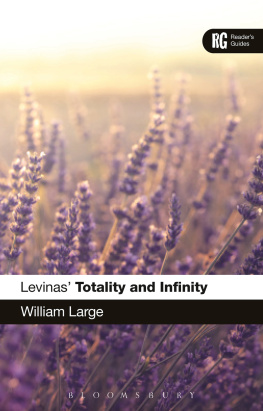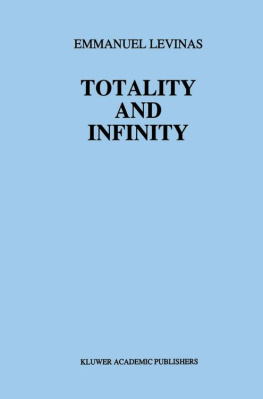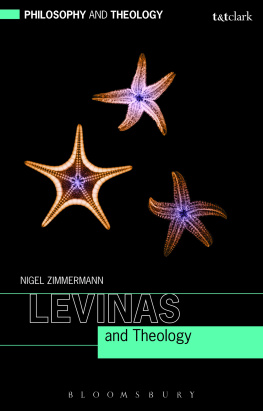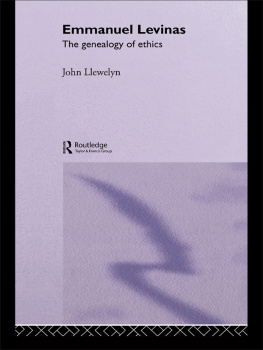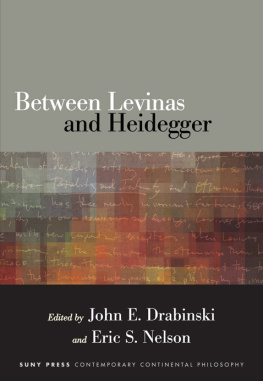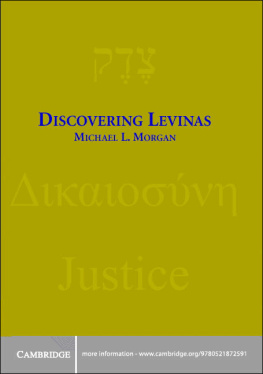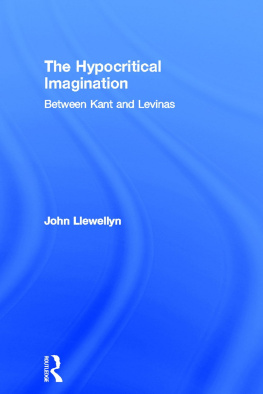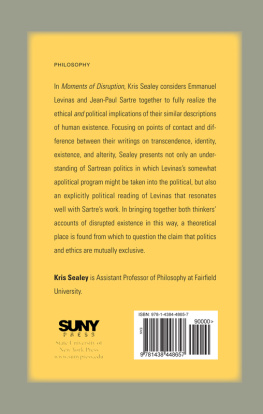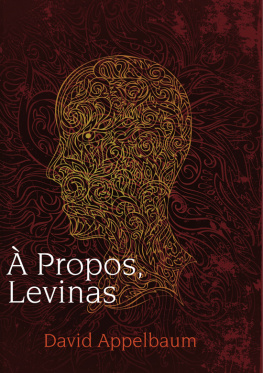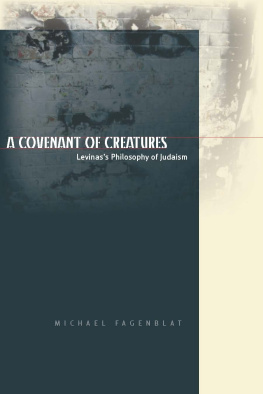Levinas
Totality and
Infinity
ALSO AVAILABLE FROM BLOOMSBURY
Readers Guides
Bloomsbury Readers Guides are clear, concise and accessible introductions to key texts in literature and philosophy. Each book explores the themes, context, criticism and influence of key works, providing a practical introduction to close reading, guiding students towards a thorough understanding of the text. They provide an essential, up-to-date resource, ideal for undergraduate students.
Titles available in this series:
Aristotles Metaphysics , Edward Halper
Aristotles Politics , Judith A. Swanson and C. David Corbin
Badious Being and Event , Christopher Norris
Berkeleys Principles of Human Knowledge , Alasdair Richmond
Berkeleys Three Dialogues , Aaron Garrett
Deleuze and Guattaris What is Philosophy? , Rex Butler
Deleuze and Guattaris A Thousand Plateaus , Eugene W. Holland
Deleuzes Difference and Repetition , Joe Hughes
Derridas Writing and Difference , Sarah Wood
Hegels Phenomenology of Spirit , Stephen Houlgate
Heideggers Later Writings , Lee Braver
Humes Enquiry Concerning Human Understanding , Alan Bailey and Dan OBrien
Kants Critique of Aesthetic Judgement , Fiona Hughes
Kants Religion within the Boundaries of Mere Reason , Eddis N. Miller
Kierkegaards Fear and Trembling , Clare Carlisle
Kuhns The Structure of Scientific Revolutions , John Preston
Lockes Essay Concerning Human Understanding , William Uzgalis
Machiavellis The Prince , Miguel Vatter
Mills Utilitarianism , Henry R. West
Nietzsches Beyond Good and Evil , Christa Davis Acampora and Keith Ansell Pearson
Nietzsches The Birth of Tragedy , Douglas Burnham and Martin Jesinghausen
Nietzsches Thus Spoke Zarathustra , Clancy Martin and Daw-Nay Evans
Platos Republic , Luke Purshouse
Platos Symposium , Thomas L. Cooksey
Rawlss A Theory of Justice , Frank Lovett
Sartres Being and Nothingness , Sebastian Gardner
Schopenhauers The World as Will and Representation , Robert L. Wicks
Wittgensteins Philosophical Investigations , Arif Ahmed
For Sally Stone
A READERS GUIDE
Levinas
Totality and
Infinity
WILLIAM LARGE
Bloomsbury Academic
An imprint of Bloomsbury Publishing Plc

CONTENTS
I first encountered Levinas Totality and Infinity as an undergraduate at the University of Essex. I was a student of Robert Bernasconi. How lucky I was to have such an expert guide and wonderful teacher. Since then I have never stopped trying to understand Levinas and this book. Even when I try not to write about Levinas, I always end up coming back to him. Why, such a long time ago, did this book have such a hold on me, and more than any other book propel me into philosophy? Of course, why one book and not another, why one thinker and not another, affects you is personal and contingent. We all have our different paths into philosophy. First of all, I think, it was his style. However difficult he was, Levinas always wrote in his own voice and about the world surrounding him. I was amused, for example, that here was a philosopher who spoke of love-bites. Second, having become by then quite sceptical of ethics in the traditional sense, he completely renewed for me what this word meant. The experience of the other as the basis of ethics, and the transformation of subjectivity this entails, still seems to me which of course does not mean I have no criticisms whatsoever true.
The best way to understand a philosopher is to teach him or her. So many students throughout the years have suffered my teaching of Levinas Totality and Infinity . Although there are several good guides on his work as a whole, there is nothing specific on this book, and though we might be sceptical of guides and commentaries (especially if the reader believes thereby that they do not have to read the original), I do think the reader needs a helping hand. Perhaps, above all, because Levinas (and why should he) does not give any context to his philosophy. He fully expects his reader to be conversant with the history of philosophy, and Husserl and Heidegger in particular. This context needs explanation, and only then does the originality of Levinas ethics emerge.
I will finish with one last word about the style of Totality and Infinity . I wrote above that one of the reasons I was attracted to Levinas (even before I had fully understood it, if one can ever fully understand a philosopher, or anyone for that matter), was his style. I can imagine for someone else this might be the very reason why they would not and could not read him. Totality and Infinity is a phenomenological book of a kind. It does not offer us a system of ethics or even a rational basis for our ethical choices (do not expect to be told how to solve ethical dilemmas). It describes, coming back to it again and again obsessively, the one and the same experience of the other who calls my self-interest into question by demanding a response from me. I have decided, in this commentary, rather than attempting to reconstruct Levinas argument logically, to track the order of his narration. The benefit of this approach is that the reader can follow the journey, with all its irregularities and byways, of the book itself. Also, if the reader so chooses, and there is a particular difficult passage, they can go straight to this part without having to read this book as a whole. The disadvantage of this approach is that, if a reader starts at the beginning and goes to the end, then, like Totality and Infinity itself, this can lead to a lot of repetition. Perhaps, with such an odd and difficult book like Totality and Infinity , however, this is not such a bad idea.
Having already acknowledged Robert Bernasconi and my students (especially my students at the University of St Mark and St John, and the University of Gloucestershire), I would also like to thank those who, from the first years, have helped me along the way: Lilian Alweiss, Simon Critchley, Lars Iyer, Thomas Wall, Philip Goodchild, Paul Grosch, David Webster and Lisa Guenther. Without the intimate other of our home, Sally Stone, nothing would have been possible.
All references to Totality and Infinity in the text are given by page number. The translation used is Emmanuel Levinas, Totality and Infinity , trans. A. Lingis (Pittsburgh: Duquesne University Press, 1969). There are two words for other in French, autre and autrui . Generally speaking, one uses the first to speak of things and the second of persons. Generally, also, Levinas tends to use the pronoun autrui to designate the other in the text. Since there is no such difference in English, the translator has translated other with a capital. I have avoided this procedure, because I believe it substantializes the other, and transforms them into something mysterious and otherworldly. It is clear that Levinas is describing the other as another person and, if he does speak of them as autre , then I will make that clear in the exposition. One other difficulty of language is the absence of the gender-neutral third-person pronoun in both French and English when speaking of persons. Is the other an it, he or she? It would be strange to speak of the other as it, because of the very impersonality of discourse that Levinas avoids, but to speak of the other as he at one time and she at another would be confusing to the reader. To avoid this awkwardness I refer to the other as they or them, although strictly speaking this is not grammatically correct. There is a philosophical problem here beyond the grammatical one, as many readers of Levinas know, since in his work he will speak of the other as she. I shall discuss this more substantial matter in the commentary below. All use of italics in quotations from Totality and Infinity are emphasis in the original.

